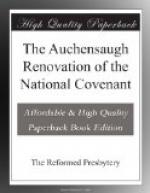As for the particular way and manner, method and circumstances of the work, we had not given any narrative of them; but that some, who came with an evil eye, to spy out our liberty, for criticizing, not for joining or profiting, have in part misrepresented the same, and may further do so; therefore, to obviate all such misreports, we have thought fit to make this brief relation thereof.
Upon Wednesday, July 23d, those who had the work in design being met together, the minister began the day’s work with prayer for special assistance to attain due preparation, and a suitable frame, throughout the whole solemnity: and thereafter had a prefatory discourse to the people, showing the nature of the work in general, its lawfulness, expediency, and necessity, from scripture precedents and approven examples of the people of God, adducing the 9th chapter of Ezra, Neh. Ezek. Dan. and Neh. x. 28, 29, for proof thereof; and of the day in particular, that it was a day of fasting and supplication, with preaching of the word, in order to preparation for the solemnities intended, both of renewing the covenants and celebrating the sacrament of the Lord’s, Supper. After which a part of the lxxviii. Psalm, from the 5th to the 12th verse being sung, Mr. John M’Neil, preacher of the gospel, had a sermon upon Jer. 1. 4, and 5. “In those days, and in that time, saith the Lord, the children of Israel shall come, they and the children of Judah together, going and weeping: they shall go and seek the Lord their God. They shall ask the way to Zion, with their faces thitherward, saying, Come and let us join ourselves to the Lord, in a perpetual covenant that shall not be forgotten.” From which text he raised and prosecuted largely, and particularly the two following observations, as most pertinent for the work of the day; the first implicitly supposed, the other more explicitly asserted in the words; viz. 1. That, a people in covenant with God may be forgetful of and deal falsely in their covenant; or that covenant-takers may be covenant-breakers. 2. That, it is the duty of a people who have broken covenant with God to engage themselves again to the Lord by the renovation of their covenant. Where in prosecuting the former, he showed by what gradual steps of declension a people usually come to deal falsely in God’s covenant, such as, (1.) By forgetfulness, Deut. iv. 23. There being a connexion between forgetting and forsaking, or dealing falsely in God’s covenant, so the church intimates, Psal. xliv. 17, 18. “All this is come upon us; yet have we not forgotten thee, neither have we dealt falsely in thy covenant; our heart is not turned back, neither have our steps declined from thy way.” And the returning remnant of Israel being sensible of this connexion, resolve to bind themselves to the Lord in a perpetual covenant that may not be forgotten. (2.) By seeking shifts and arguments to elude and evade the obligation of the covenant and to defend




